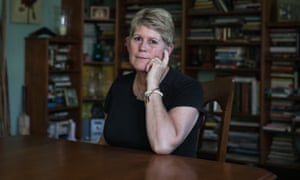Speakers get emotional about the impact of the bill at a time Australians are living with the reality of the climate crisis
Community group members and public health professionals have fought back tears while calling on the New South Wales government to drop “anti-climate” legislation that would limit planning authorities’ ability to block fossil fuel developments.
Several witnesses became emotional while giving evidence to a parliamentary hearing into the proposed laws, which are designed to stop planning authorities from rejecting or imposing conditions on projects based on their impacts overseas, including overseas emissions.
It is in part focused on scope 3 emissions, which are emissions that occur after coal or gas is sold into the market and burned. Because Australia exports much of these resources, many of these emissions occur overseas.
The NSW Minerals Council lobbied the state government in 2019 to change laws that require the Independent Planning Commission to consider these emissions when assessing a project.
It followed the NSW land and environment court’s rejection of the Rocky Hill coalmine in February,
which cited the impact the mine would have on climate change, including
through the burning of coal in other countries, at a time when “a rapid
and deep decrease” in global emissions was urgently needed.Several witnesses became emotional while giving evidence to a parliamentary hearing into the proposed laws, which are designed to stop planning authorities from rejecting or imposing conditions on projects based on their impacts overseas, including overseas emissions.
It is in part focused on scope 3 emissions, which are emissions that occur after coal or gas is sold into the market and burned. Because Australia exports much of these resources, many of these emissions occur overseas.
The NSW Minerals Council lobbied the state government in 2019 to change laws that require the Independent Planning Commission to consider these emissions when assessing a project.
Two other decisions by the IPC also cited the impact of climate change in their reasons for imposing conditions on a mine or rejecting it entirely.
But the amendments now before the NSW parliament were drafted before the unprecedented fires that have affected much of the country.
On Thursday, multiple speakers choked back tears as they spoke of the impact the bill would have at a time when Australians were living the reality of the climate crisis.
“What I find so insulting, so wilfully ignorant that it leaves me white hot with anger, is that this government and some within its departments are so easily bullied by the fossil fuel lobby to even think of introducing an anti-climate bill while Australia is burning,” Julie Lyford told the hearing.
Lyford is the president of Groundswell Gloucester, which argued in the Rocky Hill case that the mine would have a detrimental impact on climate change and the social fabric of the town.
“The proponents of this bill are climate criminals. They will be held to account one day if this bill goes through,” she said.
Dianne Montague, a member of Groundswell Gloucester, told the hearing rural communities disproportionately bore the impacts of mining and were now also “the ones bearing the burden of the impacts of climate change”.
She said the community had been living with smoke from nearby fires for months.
“Depression is everywhere. Everybody you talk to is depressed because of what’s happening,” she said.
Doctors told the hearing that the bill was a step backward in planning for health risks from fires and other extreme events associated with climate change.
Ingrid Johnston, a senior policy officer at the Public Health Association of Australia, told the hearing that the effects of global heating crossed borders. To demonstrate this, she spoke of putting a gas mask on her 11-year-old son because of severe smoke that settled over Canberra in January from fires burning in NSW.
“The last couple of months have demonstrated all too clearly that bushfire smoke doesn’t respect borders. Just ask people in the west coast of New Zealand,” she said. Other speakers identified major concerns with the wording of the bill, telling the committee it could have unintended consequences.
This included the NSW Minerals Council, which has been pushing for these changes.
The council’s policy director, Andrew Abbey, said the proposed amendments could potentially lead to a greater risk that developments would be refused outright.
“In the sense that if a project couldn’t get over the line because you can’t impose a condition on it related to scope 3 or downstream emissions the view could be formed that you subsequently don’t approve the project,” he told the hearing.
Both the council and the CFMMEU said they supported the “intent” of the bill but were not sure if it achieved its stated purpose.
And the Environmental Defenders Office, which acted for Groundswell Gloucester in the Rocky Hill Case, said the bill could limit planning authorities’ ability to consider all emissions associated with projects, including emissions that occur in Australia.
“In terms of legal drafting, this is a mess,” the principal lawyer Elaine Johnson said after the hearing.
“It’s almost impossible to determine how it would be applied.”

No comments:
Post a Comment